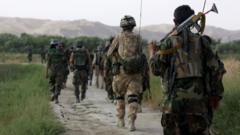The son of Peter and Barbie Reynolds, detained by the Taliban while in Afghanistan, expresses deep concern for their health as they face severe medical issues in custody. Despite previous promises of imminent release, no action has been taken, raising alarms from the UN over their detainee treatment.
Son Fears for Parents' Lives as Health Deteriorates in Taliban Custody

Son Fears for Parents' Lives as Health Deteriorates in Taliban Custody
A British couple, held by the Taliban for five months, face grim conditions in prison, sparking urgent calls for medical intervention.
The son of a British couple, Peter and Barbie Reynolds, held by the Taliban in Afghanistan for the past five months, has issued a dire warning regarding their health, suggesting they may die in prison if urgent medical care is not provided. The couple, aged 80 and 76 respectively, were arrested on February 1 while attempting to return home to Bamiyan province.
Their son, Jonathan Reynolds, reported to the BBC that their health has drastically deteriorated, with his father experiencing serious convulsions and his mother suffering from severe anaemia and malnutrition. The situation has drawn the attention of the United Nations, which cautioned that the couple could perish under such “inhumane” conditions without prompt medical treatment.
In a past statement, a Taliban official indicated intentions to secure the couple’s release “as soon as possible.” Jonathan described the agonizing wait for his parents’ release as "harrowing and surreal." Both Peter and Barbie had dedicated 18 years of their lives to education initiatives in Afghanistan prior to their arrests.
According to Jonathan, the couple has been subjected to harsh prison conditions, including confinement in a maximum security facility despite being declared innocent by a judge and without facing any formal charges. His father’s health has worsened significantly, with Jonathan stating that he now exhibits symptoms resembling early Parkinson's disease, characterized by tremors.
In the last contact with their family on June 15, the couple's deteriorating health was evident. “My dad spent half an hour convulsing on the prison floor before my mother called for assistance,” he recounted. Meanwhile, Mrs. Reynolds is reportedly struggling with confrontation of malnutrition, showing signs such as blue extremities.
Jonathan remains uncertain about the exact location of his parents within the prison system and has criticized the lack of progress regarding their release. He expressed his frustration with weekly reassurances that failed to result in any meaningful change: “Every week it seems like we're told 'just wait two or three more days now… just hang tight.'”
Despite these challenges, Jonathan acknowledged the Foreign Office (FCDO) for its communications with the family during this ordeal. The couple recently marked their 55th wedding anniversary while still imprisoned, an occasion Jonathan described with mixed feelings—glad they are together, but lamenting their lack of freedom.
On Monday, the UN called for urgent action on their behalf, noting that prolonged detention under such circumstances poses a threat to their well-being. A statement from the agency highlighted the need for access to adequate medical care to prevent potential irreparable harm or death. “It is inhumane to keep them locked up in such degrading conditions,” the UN declared, pressing for an immediate review of the couple's detention status.
Peter and Barbie Reynolds, who tied the knot in Kabul in 1970 and later became Afghan citizens, had been involved in educational projects, including training mothers and children. While their work had received local approvals, it clashed with Taliban policies restricting education for girls over the age of 12 and barring women from employment.
Taliban official Abdul Mateen Qani had stated earlier in February that a series of evaluations were ongoing to facilitate their release. The FCDO, now facing challenges post-embassy closure in Kabul after the Taliban's resurgence in 2021, has reiterated that support for British nationals in Afghanistan is critically limited and has issued travel warnings for the country.



















